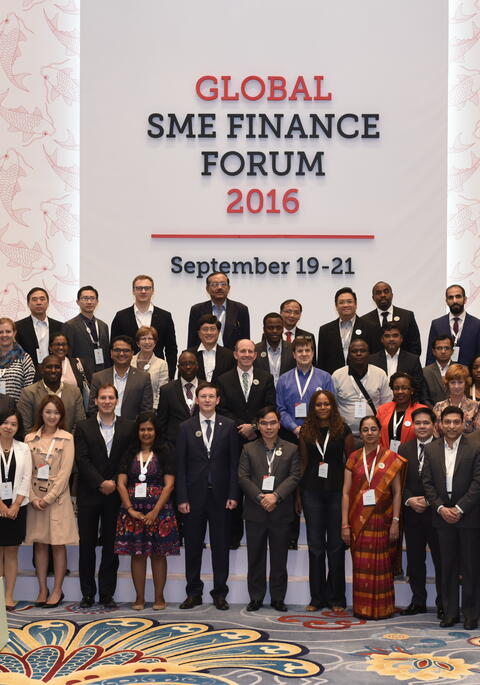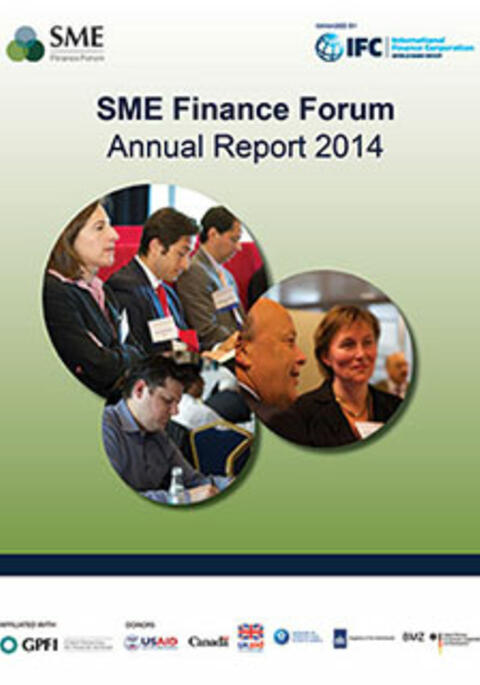-
Annual Report 2022
2022 was a turbulent year in global markets, and SMEs all over the world have been dealing with soaring inflation, disrupted supply chains and volatile foreign currency markets. And yet, we have been inspired by how our members have risen to the challenge, with dozens of new partnerships, technologies and business models, all helping to reduce the cost and increase the availability of SME finance. Members have been building next-generation supply chain finance platforms, scaling green finance for SMEs, using big data and AI to provide working capital to the unbanked, rolling out collateral-free lending and so much more. In all this work, we are excited to be your partner for another year.
Since our network’s launch in November 2015, we have grown from a few dozen committed, early adopters into a global community that includes more than 240 banks, non-bank financial institutions, FinTech companies, development banks, and others. Over the past 7 years, we have maintained a growth rate of just under 15 percent in terms of year-on-year net membership, thus demonstrating the value of the SME Finance Forum’s services in knowledge exchange, networking and public-private dialogue.

-
SME Finance Forum - Annual Report 2021
-
SME Finance Forum - Annual Report 2016
Small businesses are essential for economic growth. Indeed, they account for over 95 percent of businesses worldwide and provide more than half of all jobs.
Yet, 200 million businesses worldwide do not have the financing necessary to invest and create new jobs.
The G20 established the SME Finance Forum in 2012 to accelerate financing for SMEs. Managed by the International Finance Corporation (IFC), it brings together banks, financial technology (Fintech) companies, regulators and development finance institutions to share knowledge, spur innovation, and promote the growth of SMEs.In the last 4 years, the SME Finance Forum has become a hub for knowledge-sharing about what works —and what does not — in SME finance. The Forum has served as both a connector and a convener of the key players. It has made SME data more open and accessible so that industry leaders and policy-makers can readily use it as a basis for more informed decision-making. It has also become a bridge in global and regional SME policy through its partnerships with the G20, the Alliance for Financial Inclusion (AFI), the Asia-Pacific Economic Cooperation (APEC) Business Advisory Council (ABAC), the World Economic Forum (WEF) and other important international bodies.

-
SME Finance Forum - Annual Report 2015
2015 has been an exciting year for the SME Finance Forum. In November, we launched the SME Finance Forum global network in a ceremony hosted by Her Majesty Queen Máxima of the Netherlands, Special Advocate for the Secretary General of the UN for Inclusive Finance for Development, and the Deputy Prime Minister of Turkey, Cevdet Yılmaz. The palpable buzz generated at the event—and in various online exchanges we have convened over the last twelve months—indicates that there is a clear need to foster peer learning and exchange among a diverse set of global institutions that share an interest in promoting SME finance. With the launch of the global member network, the SME Finance Forum is even better positioned to advance public-private dialogue to accelerate small business finance.
In the months ahead, we plan to grow the network, while creating greater collaboration and knowledge-sharing opportunities for members. We will continue to expand our public-good services, including our online library with over 2,500 publications and knowledge resources and our SME finance datasets. At the same time, we want to continue shaping SME policy through our engagement in networks such as the G20 Global Partnership for Financial Inclusion (GPFI), APEC/ABAC and the Alliance for Financial Inclusion (AFI) and bringing regulators to dialogue with Forum members.
-
SME Finance Forum - Annual Report 2014
The SME Finance Forum's 2014 Annual Report provides a glimpse of the progress made by the Forum in 2014 and its future plan of transforming into a global membership organization to ensure its long-term sustainability. 2014 has been an important year for small and medium enterprise (SME) finance. Indeed, it has been a year of strong growth for the SME Finance Forum in particular.
Key Forum-sponsored events in 2014 included: the Development Finance Institutions/ International Financial Institutions (DFI/IFI) event in The Hague, the Chief Executive Officer (CEO) Roundtable in Istanbul, G-20 events in Australia, a number of events where financial institutions, Fintechs (a business area where new uses of technology and innovative business models encourage new approaches to payments, banking, lending, scoring, factoring), and IFIs/DFIs convened to learn about cutting-edge developments in the field. Two clear patterns emerged from these events:
First, there has been a broadening and deepening in the reach of the SME Finance Forum, both geographically and in terms of bringing in new players. Second, and related, is the establishment and/or deepening of key partnerships

-
SME Finance Forum - Annual Report 2013
Athough micro, small, and medium enterprises (MSMEs) in developing countries are crucial for job creation and economic development, 45 percent to 55 percent of them have unmet credit needs that stunt their growth. Women-run small and medium enterprises (SMEs) in emerging markets also face the same problems of all SMEs, and a set of special, gender-specific obstacles that vary by country and region.
About 5.3 million to 6.6 million women-owned SMEs in developing countries are estimated to be unserved or underserved by financial institutions. In an effort to address this challenge, the SME Finance Forum and Women’s Finance Hub provide platforms for policy makers and financial institutions to share knowledge, encourage innovation, and promote scaling-up of successful SME finance models.
Since their launch in April 2012 and April 2013 respectively, the Forum and the Hub have become increasingly recognized centers for knowledge and networking. Their online and offline activities increased substantially during 2013.


